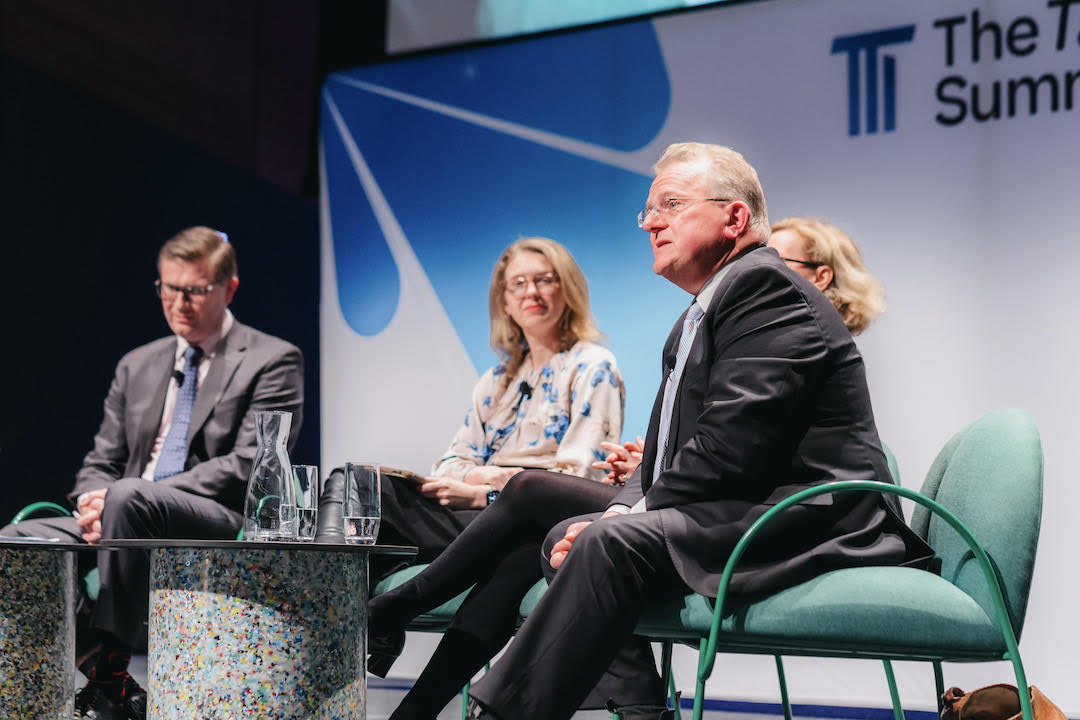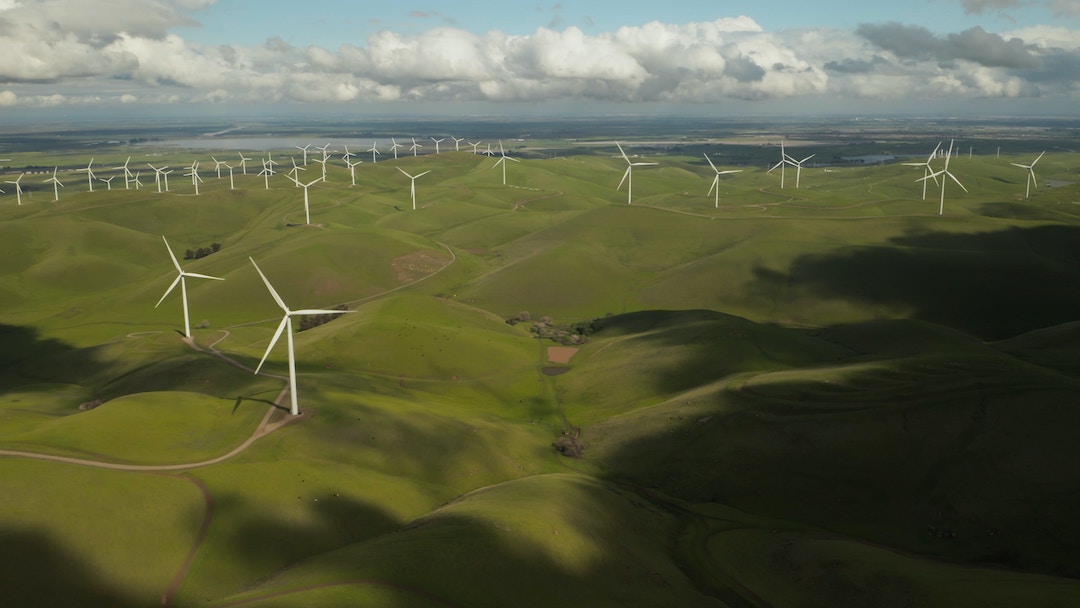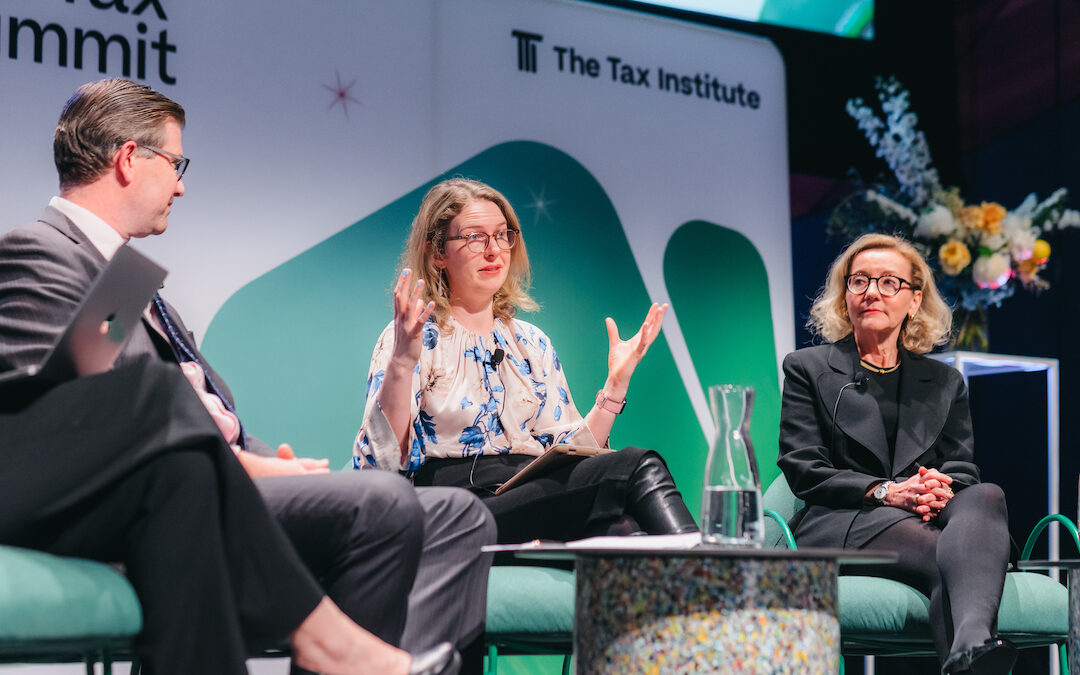At The Tax Summit 2023, a panel of experts called for the urgent need for tax reform, climate action and economic resilience in Australia, forging a path towards a brighter future for all generations.
A lively panel discussion on tax, climate and the economy kicked off at The Tax Summit 2023, hosted by The Tax Institute (TTI), with panel speakers The Hon Bruce Billson, Australian Small Business and Family Enterprise Ombudsman; Scott Treatt, CTA, The Tax Institute; Cristina Wolters, CTA, Transurban; and Danielle Wood, Grattan Institute, sharing frustrations and hope over the country’s strides towards true reform and a better Australia for future generations.
Treatt, for one, likened tax reform to a war of attrition, saying, “If we keep quiet, then you’re giving the politicians an easy way out. You’re basically accepting the behaviour of not dealing with the hard issues.
As for Treatt and the team at TTI, he said, “We will keep fighting the good fight until it gets heard.”

The current economic climate: “Cautiously optimistic”
The Reserve Bank recently announced that it has decided not to increase interest rates, and it also revealed its goal of achieving a 2-to-3 per cent inflation range by late 2025. Simultaneously, Mike Freelander, a Labor backbencher, raised questions about the perennial weaponisation of tax reform.
Speaking about the rationale behind the call for tax reform, Wood said, “It’s fair to say that we’re at a bit of an inflection point. We’ve come out of an extraordinarily unusual period, with the pandemic, recession, huge bounce back, big economic recovery, really strong labor market and, at the same time, incredibly fast inflation.
“For over a year, we’ve had the Reserve Bank, chucking on the brakes pretty hard with 12 increases in the cash rate, four percentage points – very big and quick movements. Now, we’re in this kind of ‘wait and see’ period.”
Wood further explained, “When Reserve Bank is moving, it’s like it’s navigating between two pretty ugly icebergs – one is not reacting enough and letting inflation become entrenched, leaving us in a world of very high, spiralling inflation and the other is the opposite where they overshoot and push the economy into recession, which is incredibly bad for business and everyone in the labor force.
“So, the Reserve Bank is trying to find this narrow path, and I’m cautiously optimistic that maybe they’ve done it. It was absolutely the right decision to hold [interest rates].”
From a macroeconomic sense, Wood said we’re probably at a turning point. “The economy will soften. From here, the question is, can we have a soft landing rather than a hard one? The longer term picture is really a question of what are we recovering to? Pre-COVID things were pretty sluggish. It wasn’t a very dynamic economy.
“And I think we all worry that we might go back there. And that’s not a great world to return to. We want to go back to the work world and find an economy that’s more dynamic and that avoids some of these slow-moving pressures that are coming down the pipeline.”

Australia not well-positioned for the future
As the discussion continued, a consensus emerged that businesses, regardless of their size, are grappling with the dual challenge of attracting skilled labour and contending with elevated income tax rates, particularly concerning young professionals.
Wolters said, “All businesses are looking to increase productivity and have access to a skilled workforce. When we look at the generational report, that doesn’t necessarily shine a light into Australia in terms of the place to be in the future, where young people will be looking at much higher income tax rates and then having to look after a very large population that is going to be in care.
“This is a place where it’s very difficult to even buy a house, and the world is competing for skilled labour. There are many other countries that are much more progressive with higher productivity. That is a concern.”
Wolters continued, “We have to rely on migration because we are not producing enough. Australia’s population is small compared to the rest of the world. That’s a concern for businesses. On top of that, the general costs of doing business and being able to attract people and have higher productivity by paying higher wages, from a tax reform point of view, is quite challenging. Another issue is, we spend a lot of time and cost on complying with legislation and not necessarily doing things faster and better.”

Entrepreneurship in Australia: More risk than reward
Entrepreneurs have long shouldered risks with the belief that in doing so, they’ll soon reap incredible rewards with their business. However, taking that risk to back yourself is much harder to do now than it was even a decade ago, according to Billson. “There are a range of influences contributing to this notion,” he began. “First, Australia’s not a very risk-tolerant crowd. We might aspire to be American with the wind in our hair. But we’re not [that]; we’re European in our bootstraps. We don’t want anything to go wrong. If something does, we want to blame somebody.
“Then we regulate the wazoo out of everything and wonder why there’s not a great agility in the economy. Think that through for a small business. I spend my life getting out of bed every day, trying to make the case that a small business isn’t a shrink-wrap version of a big corporate. There’s no compliance team or 20 people in the HR department. There aren’t any house lawyers or product safety experts running around. Yet, those expectations of the economy and business are infrequently right-sized for smaller respondents.
“This is troubling in a number of ways for SMEs (small- to medium-sized enterprises), he continued. “We’re in a time where there are more headwinds than there are wind in the sails. That risk/reward balance is more challenging – 43 per cent of small businesses didn’t make a profit in the last full year of reporting.”
Admitting to getting emotional over the worrying stats, Billson went on to say that 70- to 73 per cent of small businesses are earning less take home than average total weekly, full-time earnings. “There are no ‘rivers of gold’ coming to those businesses, yet the competitive landscape is challenging. We know shocks tend to advantage the already advantaged – big businesses with big resources are able to navigate those times. They have better access to finance. Their resilience is enabled by scale,” Billson said.
“In many respects, small businesses right now are exhausted. Their emotional reserves are diminished and financial reserves are straight. There are no sloppy margins to be found anywhere.”
Fanning pointed out that the younger generation is struggling to buy a house, yet they’re the ones who are set to be big contributors to paying for the previous generations’ future care. It’s a big problem and one that Treatt says the government finds easier to sit and admire than solve.
“None of our politicians, at the moment, have the courage to deal with some of these issues,” Treatt said, pointing to Jim Chalmers’ comments the day after the intergenerational report came out, as an example. “Chalmers waited until the end of the commentary before acknowledging the problem. He acknowledged that our tax system is not sustainable to look after our future – but that’s a ‘future government’s’ problem.
“Politicians have gotten so polished, that they look like they’re doing something. But, in substance, they’re doing nothing,” Treatt concluded.
Australia’s tax reform: “We can’t all be winners”
Wood shares that there is often a sentiment that tax is off limits and put in the ‘too hard’ basket. “I understand that there will be people who don’t like it, but I’m not convinced that means it’s impossible. If we tell the story, explain why the intergenerational report is a powerful frame – ‘We need to do this. We’re not going to push this burden onto our kids’, then I think we can actually bring people along,” said Wood.
Wolters chimed in, saying, “Taxpayers will go for tax benefits wherever they can. If we incentivise specific areas where the government wants people to put their money then we all have to understand that we have to give up something. Young people and old people alike; we have to give up something – we can’t all be winners. This is something tax reform will require everyone to understand.”
Treatt said, “The intergenerational report is a political tool to get the education out. They are using it in a clever manner to say, ‘We do have a problem and mums and dads, we have to understand it.’
The problem is, however, that there’s no sense of urgency. “There isn’t a real case for change. It’s a continued discussion, continued education, but real change has to come from our leaders. They must acknowledge the problem. It’ll take more serious conversations and courage to admit that there’s a lot more that must be done.”
Wood added to the discussion, saying, “Housing is the frontline of the intergenerational discussion. Housing affordability has deteriorated significantly over the past 20 years. And when people do get into the market, they’re taking on a lot more debt, which is hurting their credit. Parents realise something is wrong here. And young people are angry and frustrated.
“From an economic perspective, the fact that people cannot afford to buy a house or even rent a house now in areas close to jobs and amenities is a terrible thing for productivity.”

Carbon tax: A sensible path to net zero?
Amid a growing shift towards climate-conscious policies and investments, Wood poses a crucial question with far-reaching implications: how will this transformative journey impact the realm of taxation?
“I don’t think we understand what it means, in terms of our economy, to get on any kind of sensible path to net zero by 2050. We are seeing emissions come down and electricity, but they have to come down faster,” Wood stressed.
“That means, huge amounts of new renewable capacity, massive changes to transmission and yet, in every other part of the economy, we haven’t even shifted the dot. We haven’t seen emissions come down at all. Industrial emissions, transport emissions, agricultural emissions… – this is absolutely mammoth.
“It’s getting much more political energy. Now there is money. There are things happening, but arguably still not fast enough. So it gets very big. What does it mean for tax? Well, the bloody obvious answer is we should have a carbon tax.”

Leveraging technology for good, not evil
The discussion took a turn towards innovation and how digitalisation can be leveraged to continue improving all things tax. Billson said, “Digital technologies have done some good, with pre-filling info and data comparisons. I keep urging the Tax Office to use technology for good, not just evil.
“Technology could really support businesses. The Tax Office could leverage technology to help these businesses make better decisions, sharing insightful benchmarks like, ‘Hey, a business just like yours is only paying 11 per cent for occupancy, you’re at 18.’ Let’s use some of that technology to help [these small businesses].”
On the downside of technology for SMEs, Billson noted, “You know, digital enablement has opened up new markets, but it’s also opened up new comparison points for consumers. You might be locally based, but you have to be globally competitive with your pricing. All of a sudden, scale becomes everything.”
For more on business and leadership, check out this piece with AFL legend Kevin Sheedy where he discusses surviving and thriving in a digital world.


